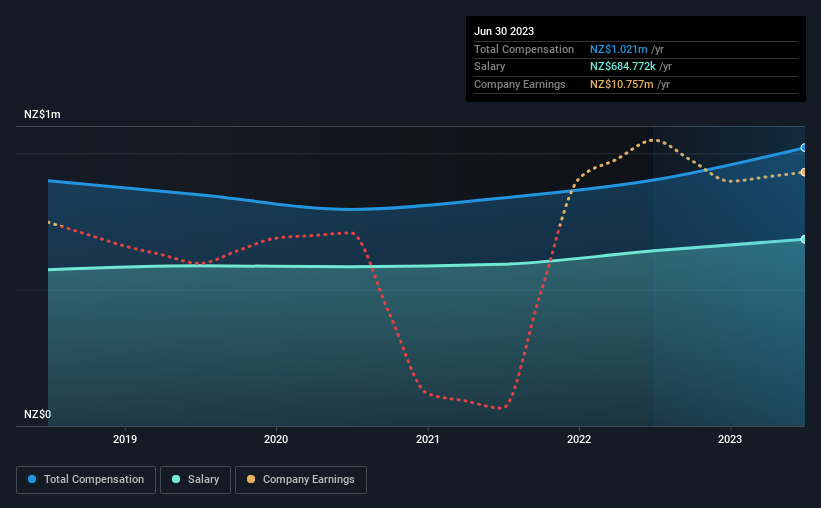Increases to New Zealand Oil & Gas Limited's (NZSE:NZO) CEO Compensation Might Cool off for now
Key Insights
New Zealand Oil & Gas to hold its Annual General Meeting on 11th of December
CEO Andrew Jefferies' total compensation includes salary of NZ$684.8k
The total compensation is 118% higher than the average for the industry
New Zealand Oil & Gas' three-year loss to shareholders was 44% while its EPS grew by 84% over the past three years
Shareholders of New Zealand Oil & Gas Limited (NZSE:NZO) will have been dismayed by the negative share price return over the last three years. Despite positive EPS growth in the past few years, the share price hasn't tracked the fundamental performance of the company. The AGM coming up on the 11th of December could be an opportunity for shareholders to bring these concerns to the board's attention. They could also influence management through voting on resolutions such as executive remuneration. We discuss below why we think shareholders should be cautious of approving a raise for the CEO at the moment.
See our latest analysis for New Zealand Oil & Gas
How Does Total Compensation For Andrew Jefferies Compare With Other Companies In The Industry?
Our data indicates that New Zealand Oil & Gas Limited has a market capitalization of NZ$83m, and total annual CEO compensation was reported as NZ$1.0m for the year to June 2023. That's a notable increase of 13% on last year. Notably, the salary which is NZ$684.8k, represents most of the total compensation being paid.
For comparison, other companies in the New Zealand Oil and Gas industry with market capitalizations below NZ$324m, reported a median total CEO compensation of NZ$468k. Hence, we can conclude that Andrew Jefferies is remunerated higher than the industry median.
Component | 2023 | 2022 | Proportion (2023) |
Salary | NZ$685k | NZ$642k | 67% |
Other | NZ$336k | NZ$259k | 33% |
Total Compensation | NZ$1.0m | NZ$902k | 100% |
On an industry level, around 63% of total compensation represents salary and 37% is other remuneration. Although there is a difference in how total compensation is set, New Zealand Oil & Gas more or less reflects the market in terms of setting the salary. If total compensation veers towards salary, it suggests that the variable portion - which is generally tied to performance, is lower.
New Zealand Oil & Gas Limited's Growth
New Zealand Oil & Gas Limited's earnings per share (EPS) grew 84% per year over the last three years. In the last year, its revenue is up 18%.
Shareholders would be glad to know that the company has improved itself over the last few years. It's a real positive to see this sort of revenue growth in a single year. That suggests a healthy and growing business. We don't have analyst forecasts, but you could get a better understanding of its growth by checking out this more detailed historical graph of earnings, revenue and cash flow.
Has New Zealand Oil & Gas Limited Been A Good Investment?
Few New Zealand Oil & Gas Limited shareholders would feel satisfied with the return of -44% over three years. So shareholders would probably want the company to be less generous with CEO compensation.
In Summary...
The fact that shareholders are sitting on a loss on the value of their shares in the past few years is certainly disconcerting. The stock's movement is disjointed with the company's earnings growth, which ideally should move in the same direction. Shareholders would be keen to know what's holding the stock back when earnings have grown. At the upcoming AGM, shareholders will get the opportunity to discuss any issues with the board, including those related to CEO remuneration and assess if the board's plan will likely improve performance in the future.
While CEO pay is an important factor to be aware of, there are other areas that investors should be mindful of as well. That's why we did some digging and identified 2 warning signs for New Zealand Oil & Gas that you should be aware of before investing.
Arguably, business quality is much more important than CEO compensation levels. So check out this free list of interesting companies that have HIGH return on equity and low debt.
Have feedback on this article? Concerned about the content? Get in touch with us directly. Alternatively, email editorial-team (at) simplywallst.com.
This article by Simply Wall St is general in nature. We provide commentary based on historical data and analyst forecasts only using an unbiased methodology and our articles are not intended to be financial advice. It does not constitute a recommendation to buy or sell any stock, and does not take account of your objectives, or your financial situation. We aim to bring you long-term focused analysis driven by fundamental data. Note that our analysis may not factor in the latest price-sensitive company announcements or qualitative material. Simply Wall St has no position in any stocks mentioned.

 Yahoo Finance
Yahoo Finance 
